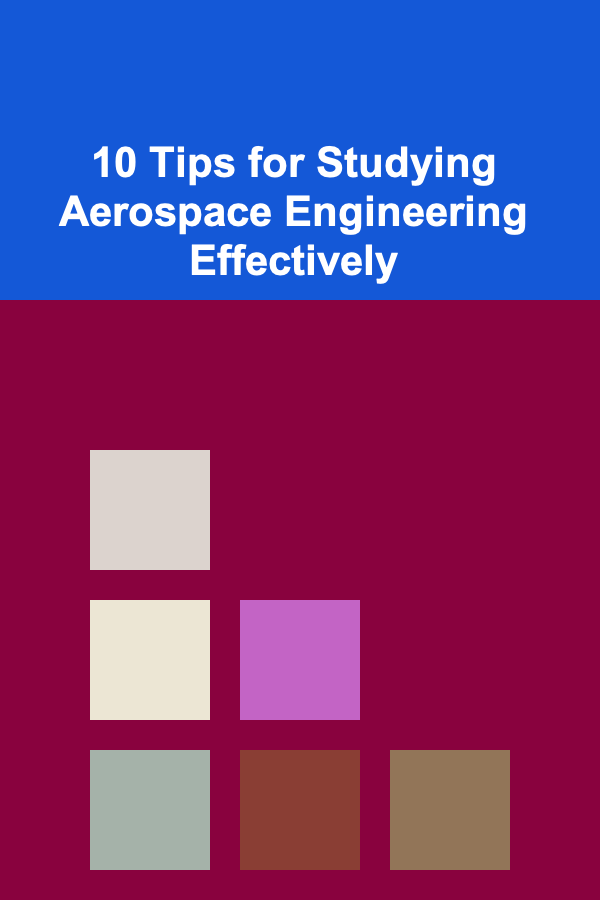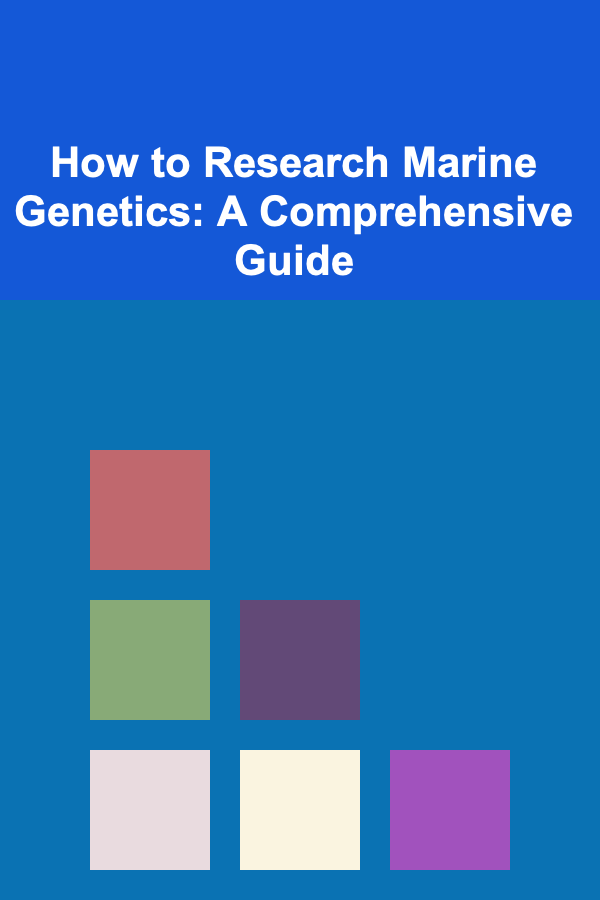
10 Tips for Studying Aerospace Engineering Effectively
ebook include PDF & Audio bundle (Micro Guide)
$12.99$7.99
Limited Time Offer! Order within the next:

Aerospace engineering is one of the most challenging and rewarding fields of study. It blends advanced knowledge in physics, mathematics, materials science, computer science, and engineering principles to design, analyze, and test aircraft, spacecraft, and satellites. As an aerospace engineering student, you're expected to master complex subjects and problem-solving techniques. While the journey can be demanding, with the right strategies, you can excel in this discipline and pave the way for a successful career.
In this article, we will cover 10 effective tips that will help you study aerospace engineering more efficiently and improve your understanding of the subject.
1. Master the Basics of Mathematics and Physics
Aerospace engineering is deeply rooted in the principles of physics and mathematics. To succeed, you need a solid grasp of these fundamental subjects, as they form the foundation of the more advanced topics you'll encounter. Topics such as calculus, differential equations, linear algebra, fluid mechanics, thermodynamics, and statics are key to understanding the complex systems you'll study later.
Why Focus on the Basics?
Mathematics is used to model physical phenomena, while physics helps you understand the forces, motions, and energy systems in the design of aerospace vehicles. If you have difficulty with these subjects, it's essential to strengthen your skills in these areas. Without a solid understanding of the basics, advanced aerospace topics will be much harder to grasp.
Actionable Steps:
- Review and practice key math concepts like integration, differentiation, and vector calculus.
- Use online resources or textbooks to revisit physics topics like Newtonian mechanics, thermodynamics, and fluid dynamics.
- Take extra help or tutoring if you find any concepts particularly challenging.
2. Stay Organized with Your Notes and Study Materials
Aerospace engineering requires you to juggle a vast amount of information and complex problem-solving methods. Organization is key to staying on top of your coursework and exam preparations. By keeping your notes and study materials in order, you'll be able to quickly locate important concepts and formulas, which is crucial when studying for exams or completing assignments.
Why Organization is Crucial?
Studying aerospace engineering often involves a mix of theoretical content, calculations, and practical applications. Keeping these materials well-organized will save you time and reduce stress, as you'll always have the right resources at your fingertips.
Actionable Steps:
- Keep separate folders (physical or digital) for each course or subject.
- Use color-coded notes to differentiate between theories, formulas, and application problems.
- Regularly review and reorganize your materials so that they stay up to date with your learning.
3. Use Practical and Hands-On Learning
While theoretical knowledge is important, aerospace engineering also requires a strong emphasis on practical, hands-on experience. Many concepts, such as fluid dynamics or aerodynamics, are better understood when you can apply them to real-world scenarios or experiments. Engaging in lab work, simulation software, and real-world projects helps solidify your theoretical learning and provides invaluable experience.
Why Hands-On Experience?
In aerospace engineering, theory and practice often go hand in hand. Many of the principles you study are directly applicable to real-world problems, such as aircraft performance, propulsion, or control systems. Participating in practical experiments or design projects helps reinforce theoretical concepts and enhances problem-solving abilities.
Actionable Steps:
- Get involved in hands-on projects like designing or building small aircraft models, drones, or rockets.
- Participate in university labs or internships that offer practical exposure to aerospace concepts.
- Use simulation tools such as MATLAB, Simulink, or ANSYS to model real-world scenarios.
4. Join a Study Group or Engineering Club
Studying aerospace engineering can be challenging, but working with others can make the process more manageable. Joining a study group or engineering club gives you access to peer support, diverse perspectives, and collaborative learning experiences. It also encourages a sense of camaraderie, as you can share struggles and successes with people who are going through similar challenges.
Why Collaborative Learning?
Studying with peers allows you to break down complex topics into simpler parts, share different methods of solving problems, and get feedback on your understanding. Moreover, discussing concepts with others can lead to better retention of material, as teaching and explaining concepts deepens your own understanding.
Actionable Steps:
- Form a regular study group with classmates to review difficult topics and practice problem-solving.
- Attend or join aerospace-related clubs at your university to connect with like-minded students and faculty.
- Participate in student competitions, such as those related to aircraft design or rocket launching, to put your knowledge into practice.
5. Focus on Problem-Solving Skills
Aerospace engineering involves a significant amount of problem-solving, whether it's determining the forces on a wing, optimizing the performance of a rocket engine, or solving fluid dynamics problems. To succeed, you need to develop strong analytical and problem-solving skills. This requires practice, patience, and the ability to break down complex problems into smaller, manageable components.
Why Problem-Solving is Important?
Problem-solving skills are at the core of aerospace engineering. Almost every aspect of the field, from aircraft design to space exploration, involves solving complex problems under constraints such as safety, cost, and efficiency. By improving your ability to approach problems methodically, you'll be better equipped to handle assignments, projects, and real-world challenges.
Actionable Steps:
- Solve a variety of problems from textbooks, practice exams, or online resources to strengthen your problem-solving skills.
- Break problems down into smaller steps, and work through each step logically.
- Don't be afraid to ask for help or clarification from professors or peers when you're stuck on a difficult problem.
6. Utilize Technology and Software Tools
Aerospace engineering heavily relies on various software tools and technologies to model, analyze, and design systems. Tools like AutoCAD, SolidWorks, MATLAB, and Computational Fluid Dynamics (CFD) software are essential for engineers in the field. Getting comfortable with these tools during your studies will give you an edge in both academic and professional settings.
Why Technology is Essential?
As the industry continues to evolve, aerospace engineers must be proficient in the use of cutting-edge software to simulate and optimize designs before building prototypes. Knowing how to use these tools not only boosts your technical skills but also prepares you for the practical demands of the aerospace industry.
Actionable Steps:
- Learn how to use industry-standard software such as MATLAB, CATIA, or SolidWorks for design and analysis.
- Take online courses or tutorials to enhance your proficiency in simulation and design tools.
- Work on small projects or assignments that require the use of these tools to gain hands-on experience.
7. Maintain a Strong Work-Life Balance
Studying aerospace engineering can be intense, with demanding coursework, labs, and projects. While it's essential to stay focused on your studies, maintaining a healthy work-life balance is just as important. If you burn out, your productivity and performance will suffer. Taking regular breaks, exercising, socializing, and sleeping well can enhance both your mental and physical well-being.
Why Balance is Key?
Excessive stress can hinder your ability to concentrate, think clearly, and retain information. A balanced lifestyle helps maintain energy levels and creativity, which are crucial for complex problem-solving and sustained academic performance. Moreover, taking breaks can improve long-term retention by giving your brain time to process and consolidate the material.
Actionable Steps:
- Set aside time for physical activities, such as exercising, walking, or yoga.
- Practice mindfulness or meditation to reduce stress and improve focus.
- Ensure you get enough sleep each night to maintain mental clarity and productivity.
8. Develop Strong Communication Skills
Aerospace engineering isn't just about technical knowledge; it's also about being able to communicate your ideas and findings clearly and effectively. Whether it's writing reports, presenting designs, or collaborating with teams, strong communication skills are essential for success in the field. Being able to explain complex concepts in simple terms can make you a more effective engineer and leader.
Why Communication is Crucial?
Aerospace engineers often work in teams or with clients, and clear communication is essential for conveying complex technical information. Additionally, strong writing skills are needed for creating research papers, project reports, and documentation. In many cases, the ability to present ideas clearly can be as important as the technical skills themselves.
Actionable Steps:
- Take courses in technical writing and public speaking to enhance your communication abilities.
- Practice explaining complex concepts in simple terms to people who may not be familiar with aerospace engineering.
- Participate in group projects and presentations to build confidence in presenting your work.
9. Stay Curious and Keep Learning
Aerospace engineering is a dynamic and evolving field, with new technologies, innovations, and research constantly shaping the industry. To stay ahead, it's important to remain curious and keep learning. Stay updated on the latest developments in aerospace technology and look for opportunities to expand your knowledge beyond the classroom.
Why Lifelong Learning Matters?
As technology advances, aerospace engineering methods and tools also evolve. By staying curious and continuing to learn, you can keep pace with the latest trends and innovations. This mindset will not only help you as a student but will also serve you well throughout your career as an engineer.
Actionable Steps:
- Follow aerospace engineering journals, blogs, and industry news to stay informed about the latest trends.
- Attend conferences, webinars, and workshops to network with professionals and expand your knowledge.
- Explore advanced topics or specializations in aerospace engineering that interest you, such as propulsion systems, avionics, or space exploration.
10. Seek Mentorship and Networking Opportunities
Having a mentor who is experienced in aerospace engineering can provide invaluable guidance as you navigate through your studies. Mentorship allows you to learn from someone who has already gone through the challenges you're facing and can offer practical advice and insight. Networking with professionals in the field also opens doors to internships, job opportunities, and collaborations.
Why Mentorship and Networking Matter?
A mentor can provide you with personalized advice, career guidance, and industry insights that help you grow as an engineer. Additionally, networking with professionals and fellow students can create opportunities for collaboration, internships, and future career advancement.
Actionable Steps:
- Seek out professors, industry professionals, or alumni who can serve as mentors.
- Attend industry conferences, career fairs, and networking events to meet professionals in the aerospace sector.
- Use social media platforms such as LinkedIn to connect with aerospace engineers and companies.
Conclusion
Studying aerospace engineering can be demanding, but with the right strategies and mindset, it can also be immensely rewarding. By mastering the fundamentals, staying organized, developing strong problem-solving skills, and engaging in hands-on learning, you can set yourself up for success in this challenging field. Remember that aerospace engineering requires not only technical expertise but also strong communication skills, continuous learning, and the ability to collaborate effectively with others.
Stay focused, stay curious, and with dedication, you'll be well on your way to becoming a successful aerospace engineer.
Reading More From Our Other Websites
- [Gardening 101] Organic Boost: Natural Fertilizer Formulas for Every Season
- [Gardening 101] Tips for Thriving in a Shade Garden
- [Home Family Activity 101] How to Plan a Fun Day Trip to a Local Museum
- [Personal Care Tips 101] How to Create a Personal Care Routine for a Digital Detox That Truly Recharges You
- [Polymer Clay Modeling Tip 101] How to Use Silicone Molds for Replicating Complex Polymer Clay Structures
- [Organization Tip 101] Why Organizing Your Digital Space Is Just as Important as Your Physical Space
- [Home Budget Decorating 101] How to Budget for Home Decor: Tips and Tricks
- [Home Rental Property 101] How to Write a Lease Agreement that Protects You and Your Tenants
- [Trail Running Tip 101] Trail Running Essentials: Gear, Technique, and Safety Tips for Runners of All Abilities
- [Soap Making Tip 101] Scented Strength: Top Masculine Fragrances for DIY Soap Makers

How to Prepare Financially for a Career Change or Job Loss
Read More
How to Use Etsy Shop Management to Make Money
Read More
Social Movements: Understanding Collective Action and Social Change
Read More
How to Develop Climate-Smart Agriculture Practices
Read More
How to Research Marine Genetics: A Comprehensive Guide
Read More
10 Tips for Rock and Mineral Photography
Read MoreOther Products

How to Prepare Financially for a Career Change or Job Loss
Read More
How to Use Etsy Shop Management to Make Money
Read More
Social Movements: Understanding Collective Action and Social Change
Read More
How to Develop Climate-Smart Agriculture Practices
Read More
How to Research Marine Genetics: A Comprehensive Guide
Read More